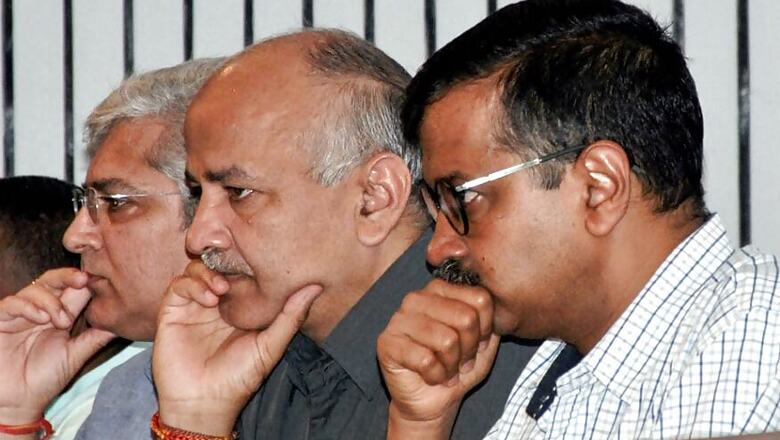
views
Revolutions eat their children, goes the famous saying. This maxim was very effectively used by one of the founders of political journalism, Jacques Mallet du Pan, while writing pamphlets during the French Revolution, in support of the Royalists.
Born from the cradle of Anna Hazare's anti-corruption movement and three years after it won a thumping majority, Delhi's ruling Aam Aadmi Party (AAP) is bracing itself to face challenges of real politics. In the process, contradictions, both ideological and personal, are getting manifested.
The latest farce in this context was played out in the Delhi Legislative Assembly, where a motion moved to provide succour to the victims of the 1984 anti-Sikh riots ended up demanding that the late Rajiv Gandhi be stripped off the Bharat Ratna, the highest civilian award bestowed by Government of India. It led to a skirmish among different factions of the ruling party inside the House, it played out on their WhatsApp group and later spilled over into news columns.
This was followed by frantic calls by the party's crisis managers to media houses, 'clarifying' that the resolution ‘adopted’ was not in harmony with the party's official line and that it was personal opinion of a particular legislator.
This explanation was unjustifiable rather indefensible as over 90% of seats in the Delhi Assembly are occupied by AAP members, and the resolution could be their doing alone. This time around, they certainly cannot blame it on Prime Minister Narendra Modi.
Why should a party, which feted a reporter who misused his journalistic licence at a press briefing and threw a shoe at then home minister P Chidambaram over Congress tickets to Sajjan Kumar and Jagdish Tytler, be so apologetic about a resolution damning the anti-Sikh riots in the harshest of terms? The Sikh victims of Delhi riots have all these years been represented in their legal cases by lawyer HS Phoolka, who incidentally is an AAP legislator in Punjab Assembly and for some time even held the position of Leader of Opposition in the House. Then why this reservation about the Rajiv Gandhi reference in the resolution?
Running with the hare, hunting with the hounds. That's what the AAP leadership is attempting, placating the divergent views within its rank and file even as it makes a desperate attempt to board an anti-BJP bandwagon to survive in the rough and tumble of politics, with the high tide of Anna Hazare movement having receded beyond recognition.
However, the party's squally cadre, so far applauded for all their acts of aggression, may not adhere to a party line with which it doesn't concur with.
The resolution farce must have created a dilemma in the minds of pro-alliance advocates within the Congress on whether an agreement with M/s Arvind Kejriwal and Manish Sisodia will filter down to the likes of MLAs Somnath Bharti and Jarnail Singh, or for that matter would it be palatable to Mr Phoolka.
What guarantees does Kejriwal-Sisodia combine have that in the event of an alliance, these hardliners would not enter the contest under a different banner and festoon.
Delhi Congress president Ajay Maken has so far remained steadfast on his position of no alliance with the AAP. Former chief minister Sheila Dikshit, who was seen to be pro-alliance, has left it to the wisdom of the party high command. Thus, there are not very many backers for a Congress-AAP alliance in the Delhi Congress.
A closer to reality analysis of Delhi would show that for 2019 Lok Sabha polls, the Congress has credible probable candidates on five of the seven seats — Sandeep Dikshit in East Delhi, JP Agarwal in North-East Delhi, Kapil Sibal in Chandni Chowk, Ajay Maken in New Delhi and Mahabal Mishra in West Delhi (all former MPs).
In the reserved constituency of North-West Delhi, the party, in fact, has problem of plenty with at least three former MLAs – Jai Kishan, Raj Kumar Chouhan and Surendra Kumar — in the race. The only seat which is lacking in a ‘natural claimant’ is South Delhi, with former MP Sajjan Kumar facing prolonged incarceration in the anti-Sikh riot case.
Will the Congress high command be able to contain the ambition and aspirations of these leaders? Unlikely. Of them, only Kapil Sibal is said to be somewhat amenable to the idea of alliance and that is largely due to his alienation with the local leadership. He may prefer to contest a safer seat than Chandni Chowk, which is presently represented by Union Environment Minister Harshvardhan.
Within the AAP leadership, the worry is that a poor performance in 2019 Lok Sabha polls may impinge on party' prospects in the next assembly polls in 2020.
Kejriwal is hoping that going against the tide of cadre sentiment, the Congress high command may still align with it as it did in 2013 to make him Chief Minister for the first time. But back then, the Congress paid a heavy price for it by getting almost wiped out from the city’s political terrain. Having regained some ground after four years of struggle, will the Congress commit itself again to similar alliance? Time would tell.
(Author is a political analyst. Views are personal)

















Comments
0 comment